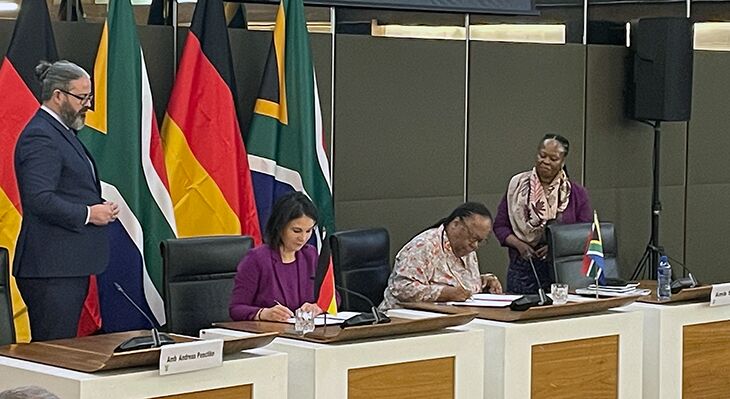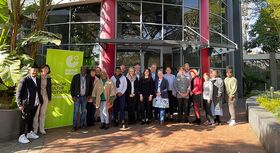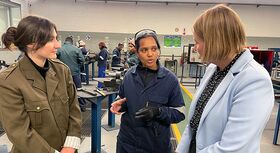Vocational training cooperation with South Africa: A strong collaboration
13.07.2023
In the context of the German-South African Binational Commission, the Federal Ministry of Education and Research extended its cooperation agreement with the South African partner ministry.

"Skills development and TVET are key topics in our bilateral cooperation," stated Naledi Pandor, South Africa's Foreign Minister and former Minister of Education, during the presentation of the Joint Final Document of the 11th Binational Cooperation (BNK) between South Africa and Germany in Pretoria . Together with German Foreign Minister Annalena Baerbock, she emphasized that both countries are united by the historical experience of hard-won democracy and continue to be united by common agendas and values.
The German-German-South African Binational Commission
The German-German-South African Binational Commission have been held since 1996 alternately in the two partner countries under the auspices of the Foreign Ministry and with the participation of line ministries. Within the framework of the BNK, topics, focal points and lines of implementation for cooperation are defined and decided by joint resolution. The German Federal Ministry for Vocational Education and Training (BMBF); Federal Ministry for Economic Cooperation and Development (BMZ) and the Federal Ministry of Labour and Social Affairs (BMAS) were involved in the joint working group on labor, social affairs and vocational training. GOVET plays a key role in shaping the BMBF's vocational training cooperation.

Several ministries contribute to vocational training cooperation with South Africa, and their activities can be found in a joint chapter of the BNK Report. The further qualification of vocational training personnel is a particularly important issue for South Africa. Both BMZ and the BMBF have been involved in this field of action for years. Among the activities are, for example, GIZ projects such as "Employment prospects in the digital world" or "Vocational prospects for employment", which integrate previous lines of teaching staff development; plans for a teacher training center (KfW) and the BMBF funding project "TRAINME", which has met with great approval and is to be further expanded. A bilateral group of experts on the development of teaching staff and curricula is coordinated for the German side by GOVET at the Federal Institute for Vocational Education and Training (BIBB).
In addition, the major transformation issues are shaping the new priorities in the cooperation between the two countries and also in the area of vocational education and training. The Joint Energy Transition Partnership can only be successful if the technological transformations are coupled with training and qualification. Sustainability in vocational training will play a greater role in future cooperation. The two countries also have a lot in common when it comes to building green hydrogen economies - here, too, the development of vocational skills is essential and an exchange is planned.
Armin Reinartz, Head of the International Cooperation Division at the BMBF, and Birgit Pickel, Head of the Africa Division at the BMZ, emphasized that vocational training cooperation is of strategic importance for successful structural change. For the South African Department of Higher Education and Training (DHET), Head of Department Dr. Nkosinathi Sishi placed bilateral cooperation in the context of high youth unemployment, which threatens the social dividend of South Africa's post-apartheid transformation. With 3.4 million young people neither in education nor in employment, and youth unemployment well above 50%, the focus of cooperation must be on creating job prospects. To this end, the BMBF and DHET renewed their Memorandum of Understanding on Cooperation in Vocational Education and Training for another three years.

Prior to the political part of the meeting, a vocational training delegation from the BMBF, GOVET, iMOVE and the DLR project management agency visited South African and German partner institutions in the country and learned about the multifaceted activities in vocational training cooperation. Several South African TVET colleges provided insight into their programs and the implementation of cooperation measures with German partners. The Quality Council for Trades and Occupations presented the development of standards (curricula) in cooperation with the business community and the new qualification framework for vocational education. It aims to strengthen work-based training programs and thus make the equivalence and comparability of vocational qualifications with university degrees visible. There is a long way to go to achieve the desired parity of esteem for both types of education, but the course is being set. South Africa also benefits from its small but internationally respected research community on vocational training and employment. In a close exchange with researchers from the Center for Researching Education and Labor, the German delegation was able to gain an impression of the research priorities, the promotion of young researchers and the international radius of a top South African institution. Vocational education and training research is included as a potential for further cooperation in the latest cooperation agreements.
German companies, the Chamber of Commerce Abroad and, within the framework of support projects, also the Chambers of Crafts and Trades make important contributions to training in South Africa. The AHK offices in Johannesburg and Cape Town provided information on this and gave insights into their work. In Cape Town, the AHK is working together with the HOPE Cape Town Foundation to introduce and adapt dual-track training programs. The Goethe-Institut focuses on vocational orientation by offering technical language courses and initial advice on the German training system. In programs of the German Academic Exchange Service (DAAD), courses offered by German universities of applied sciences are increasingly aimed at practical relevance and employment orientation. The delegation met with German schools in Johannesburg and Pretoria to discuss the potential of vocational branches at the secondary level.
GOVET had recently coordinated an exchange process of departments and actors in South African cooperation, which already demonstrated the impressive variety of institutions involved and their cooperation initiatives. The on-site visits confirmed how intensively and efficiently the German actors contribute to a coherent country cooperation.